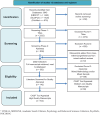Qualitative studies on men with prostate cancer: a systematic meta-synthesis
- PMID: 39719863
- PMCID: PMC11703379
- DOI: 10.1080/17482631.2024.2436720
Qualitative studies on men with prostate cancer: a systematic meta-synthesis
Abstract
Purpose: Prostate cancer (PCa) is the second most common cancer among men. Despite advancements in clinical interventions and improvements in public health outreach, a multi-dimensional lack of understanding of the lived experiences of men diagnosed with PCa continues. Improving the quantity and quality of knowledge about this subject could guide clinical decisions and interventions for this group.
Methods: This paper reviews qualitative studies focusing on PCa patients using the Critical Appraisal Skills Programme tool (CASP), synthesizes the data, and maps the overarching themes through a systematic meta-synthesis.
Results: The authors identified 3546 manuscripts, of which 103 met the inclusion criteria. Six themes were identified that addressed: support needs, diagnosis, and treatment experiences, lived experiences, information accessibility, care, and threats to masculinity.
Conclusion: Treatment side-effects caused a re-configuration and re-evaluation of masculine ideologies. Men mainly relied on close family and support groups to cope with their feelings of stigma, uncertainty, and recovery. Professional healthcare and consultation quality eased their anxiety concerning long-term treatment and other factors associated with their condition. The studies were socio-demographically heterogeneous. Thus, researchers could use qualitative research to explore knowledge gaps in the following interconnected themes: masculinity care, masculinity support, masculinity information, and incorporating a more diverse socio-demographical sample.
Keywords: Men; critical appraisal skills programme tool; meta-synthesis; prostate cancer; qualitative studies; review.
Conflict of interest statement
No potential conflict of interest was reported by the author(s).
References
-
- Abel SD . (2002). The Psychological Experiences of African American Men Diagnosed with Prostate Cancer: A Phenomenological Investigation. Journal of African American Men, 6(4), 17–38.
-
- Alexis, O., & Worsley, A. J. (2018). A meta-synthesis of qualitative studies exploring men’s sense of masculinity post–prostate cancer treatment. Cancer Nursing. 41(4), 298–310. Retrieved February 7, 2019, from. https://journals.lww.com/cancernursingonline - PubMed
Publication types
MeSH terms
LinkOut - more resources
Full Text Sources
Medical
Miscellaneous

